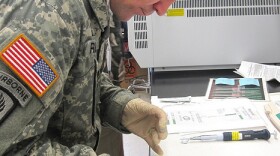http://stream.publicbroadcasting.net/production/mp3/wned/local-wned-957969.mp3
A Buffalo company’s experimental medicine may come in handy if Japan’s Fukushima Daiichi nuclear power plant begins leaking significant amounts of radiation.
Cleveland Biolabs, located on the Buffalo Niagara Medical Campus, has been working the phones with various U.S. government agencies about the possibility of shipping doses of its anti-radiation drug, Protectan (formerly CBLB502), to the embattled island.
Currently, there are no Food and Drug Administration (FDA)-approved medicines designed to treat radiation poisoning. Protectan was “fast tracked” by the FDA in 2010, but won’t see final approval before mid-2012.
Yet, Japanese officials have indicated they may want to order and administer large doses of it, should radiation begin to spread widely following a nuclear disaster.
“It’s our duty to provide the drug to Japan, but they need to decide that they want it. And they can use it without final approval, which, of course we’re working on. But [approval] will not happen in time,” says Michael Fonstein, president and CEO of Cleveland Biolabs.
If the Japanese decided the need for Protectan was great enough, they could decide to suspend their drug approval laws, says Fonstein.
“This is a decision which is definitely above my pay grade," he says. "It depends on how the situation will develop. And how willing [the] parties will be."
Timing is key
Cleveland Biolabs has some doses of the medicine on hand already. But if a nuclear disaster were to occur there'd be a lag time between the decision to use the drug, shipping it to Japan, and administering it to the sick.
That could be tricky, since, according to Fonstein, the drug has to be administered within 48 hours of exposure to radiation.
Clinical trials show the drug can mitigate effects from radiation and increase chances of survival after exposure. But the drug has never been tested on humans. Medical studies have demonstrated the drug’s safety to the FDA; that's partially how the drug's worthiness for "fast tracking" was determined.
Still, Fonstein is quick to caution that Protectan can’t be expected to be a cure-all.
“There are no miracle drugs,” he says.
Regardless, speculation over Protectan’s possible use in Japan has resulted in a jump to Cleveland Biolabs's stock price.






